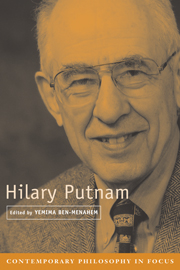Book contents
- Frontmatter
- Contents
- List of Contributors
- Acknowledgments
- 1 Introduction
- 2 Putnam's “The Meaning of ‘Meaning’”: Externalism in Historical Context
- 3 The Face of Perception
- 4 Realism, Beyond Miracles
- 5 Putnam on Skepticism
- 6 The Tale of Quantum Logic
- 7 Another Philosopher Looks at Quantum Mechanics, or What Quantum Theory Is Not
- 8 Structural Realism and Contextual Individuality
- 9 The Rise and Fall of Computational Functionalism
- 10 The Pragmatic Turn: The Entanglement of Fact and Value
- Index
- References
9 - The Rise and Fall of Computational Functionalism
Published online by Cambridge University Press: 08 January 2010
- Frontmatter
- Contents
- List of Contributors
- Acknowledgments
- 1 Introduction
- 2 Putnam's “The Meaning of ‘Meaning’”: Externalism in Historical Context
- 3 The Face of Perception
- 4 Realism, Beyond Miracles
- 5 Putnam on Skepticism
- 6 The Tale of Quantum Logic
- 7 Another Philosopher Looks at Quantum Mechanics, or What Quantum Theory Is Not
- 8 Structural Realism and Contextual Individuality
- 9 The Rise and Fall of Computational Functionalism
- 10 The Pragmatic Turn: The Entanglement of Fact and Value
- Index
- References
Summary
INTRODUCTION
Hilary Putnam is the father of computational functionalism, a doctrine he developed in a series of papers beginning with “Minds and Machines” (1960) and culminating in “The Nature of Mental States” (1967b). Enormously influential ever since, it became the received view of the nature of mental states. In recent years, however, there has been growing dissatisfaction with computational functionalism. Putnam himself, having advanced powerful arguments against the very doctrine he had previously championed, is largely responsible for its demise. Today, he has little patience for either computational functionalism or its underlying philosophical agenda. Echoing despair of naturalism, he dismisses computational functionalism as a utopian enterprise.
My aim in this essay is to present both Putnam's arguments for computational functionalism and his later critique of the position. In section 2, I examine the rise of computational functionalism. In section 3, I offer an account of its demise, arguing that it can be attributed to recognition of the gap between the computational-functional aspects of mentality and its intentional character. This recognition can be traced to two of Putnam's results: the familiar Twin-Earth argument, and the less familiar theorem that every ordinary physical system implements every finite automaton. I close with implications for cognitive science.
THE RISE OF COMPUTATIONAL FUNCTIONALISM
Computational functionalism is the view that mental states and events – pains, beliefs, desires, thoughts and so forth – are computational states of the brain, and so are defined in terms of “computational parameters plus relations to biologically characterized inputs and outputs” (1988:7).
Information
- Type
- Chapter
- Information
- Hilary Putnam , pp. 220 - 250Publisher: Cambridge University PressPrint publication year: 2005
References
Accessibility standard: Unknown
Why this information is here
This section outlines the accessibility features of this content - including support for screen readers, full keyboard navigation and high-contrast display options. This may not be relevant for you.Accessibility Information
- 13
- Cited by
